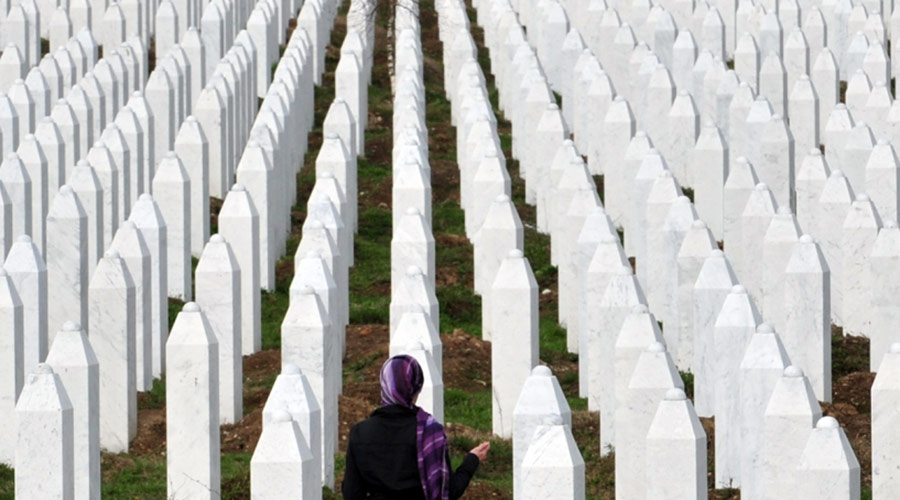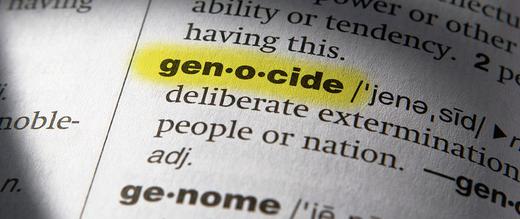The views expressed in our content reflect individual perspectives and do not represent the authoritative views of the Baha'i Faith.
As a professor of sociology and criminology, I seek to understand genocide, ranging from why it begins to how societies mend in the aftermath.
I actually became motivated to understand genocide in a classroom. My public health and human rights class had invited a guest speaker on genocide. As I sat in my seat, I was shocked when the speaker discussed genocides I had never even heard of, like the violence that occurred in Guatemala or in Bosnia. I could not believe that genocide kept happening, and I hoped that I could one day understand why.

Bosnian Genocide Cemetery
Years later, I found myself sitting on a hillside in Valentina’s home country of Rwanda. I went there to conduct research, and that afternoon, I interviewed a 50-year-old man named Jean-Paul. Jean-Paul had been convicted of committing genocide and was sentenced to the community service center where I visited him.
You see, unlike Valentina, Jean-Paul was considered a Hutu—the majority group—in 1994 Rwanda. When the genocide started, he was a working-class farmer, with a wife and four children. He had no criminal background and no history of violent behavior. Yet, as the violence escalated, local leaders convinced him that Tutsis were dangerous and could hurt his family. Determined to keep this from happening, Jean-Paul joined a militia hunting Tutsis.
Jean-Paul’s actions were motivated, in large part, by fear—fear that Tutsis could hurt his family. His murderous actions also arose from an us/them mentality Jean-Paul had been taught from a very young age. In primary school, he had learned that Hutus and Tutsis were fundamentally different groups of people. In reality, Hutus and Tutsis were what sociologists call socially-constructed groups. This means that there was no natural difference between them—just like any race or ethnicity. But, as we all know, social constructions can seem very real.
Talking with Jean-Paul that afternoon, I found it really hard to imagine that he had killed two people during the genocide. He smiled and laughed throughout much of our conversation. He also told me about his grandchildren and shared that he could not wait to see them when he was done with his sentence—reminding me that people who commit genocide are not fundamentally evil, but are rather normal people who do extraordinarily harmful things when faced with certain situations.
Understanding the social situation thus becomes very important for understanding genocide.
For instance, Jean-Paul’s fear was partially influenced by a civil war between Hutus and Tutsis just a few years before the genocide. The civil war had brought much instability to Rwanda, and with it, much fear. Jean-Paul’s notion that Hutus and Tutsis were fundamentally different was also widespread. Government leaders and political elites had manipulated people into believing it, often using radio stations and magazines to declare that Tutsis—like Valentina—were not human. The leaders said that Tutsis were dangerous cockroaches who needed to be exterminated. This thinking benefited these leaders, who perceived Tutsis as a threat to their power.
Many of these same factors actually influence genocide worldwide. I studied all genocides that have taken place since the Holocaust, and identified the risk factors present before each genocide. For instance, a civil war is the strongest risk factor for a subsequent genocide, just like the civil war in Rwanda. Exclusionary, racist ideologies that influence us/them thinking—like the thinking that distinguished between Hutus and Tutsis—often precede genocide as well. Genocide also becomes more likely when government leaders feel threated—often by other groups attempting to take their power—and when these leaders have unrestrained power to choose genocide against that perceived threat.
This means that we know a great deal about why genocide happens, bringing us further toward eradicating genocide and bringing us to the last step—how to respond.
The Baha’i teachings say that we can eradicate genocide, racism and war—if we can unite:
The unity which is productive of unlimited results is first a unity of mankind which recognizes that all are sheltered beneath the overshadowing glory of the All-Glorious, that all are servants of one God; for all breathe the same atmosphere, live upon the same earth, move beneath the same heavens, receive effulgence from the same sun and are under the protection of one God. This is the most great unity, and its results are lasting if humanity adheres to it; but mankind has hitherto violated it, adhering to sectarian or other limited unities such as racial, patriotic or unity of self-interests; therefore, no great results have been forthcoming. – Abdu’l-Baha, The Promulgation of Universal Peace, p. 191.
The Universal Declaration of Human Rights, the Convention on the Prevention and Punishment of the Crime of Genocide, and the similar measures concerned with eliminating all forms of discrimination based on race, sex or religious belief; upholding the rights of the child; protecting all persons against being subjected to torture; eradicating hunger and malnutrition; using scientific and technological progress in the interest of peace and the benefit of mankind — all such measures, if courageously enforced and expanded, will advance the day when the spectre of war will have lost its power to dominate international relations. – The Universal House of Justice, 1985 Oct, The Promise of World Peace, p. 3.
Our unity, Baha’is believe, is the chief prerequisite for reducing the world’s genocidal violence.
This essay came from a TED talk given by Hollie Nyseth Brehm which can be watched here.
Next: The Human Family, Responding to Genocide

















Comments
Sign in or create an account
Continue with Facebookor